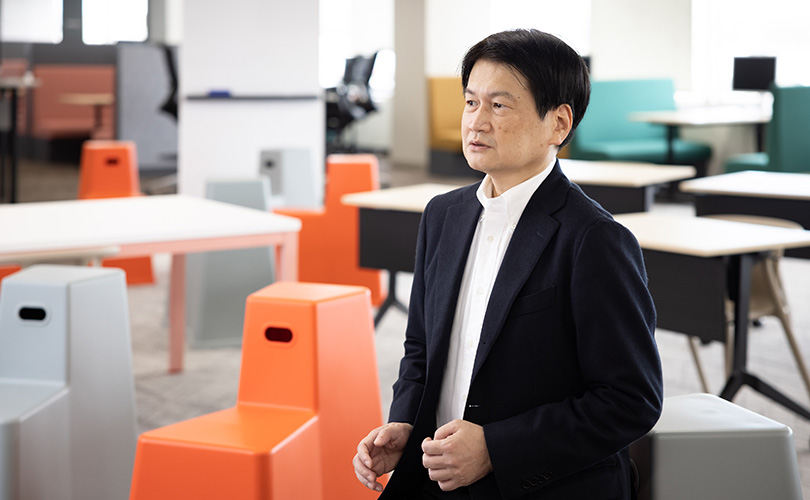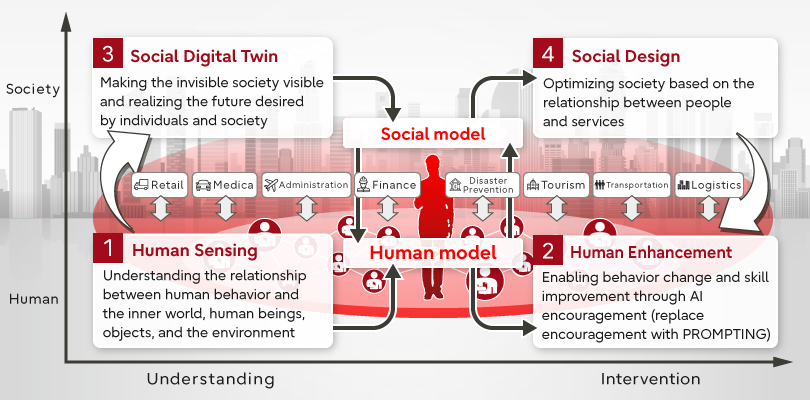Converging Technologies
Solving social issues with digitally converging multidisciplinary knowledge
Daiki Masumoto
SVP
Head of Converging Technologies Laboratory Research Unit Fujitsu Limited



Widening the scope of issue solving
Today, as digital technology becomes an ever more indispensable part of our lives, society is continually diversifying and new values are emerging. The priorities are for society as a whole to develop sustainably while maintaining fairness and responding to people’s often widely varying interests. This demands a broad set of solutions from multiple perspectives, which are counteracted by the increasing fragmentation within the fields of study and research that are working to address specific issues. While vast amounts of expertise are accumulated in each field, the challenge is how to apply a wider focus – balancing the ability to delve deeply into one field while taking others into account. In an increasingly diverse society, research and development that is confined to a single field is quite simply no longer appropriate.
Fujitsu's Converging Technologies Laboratory (CT Lab) believes that this situation requires a new approach that combines multiple disciplines. As a result, we are conducting R & D on Converging Technologies, which combine multidisciplinary knowledge including natural science, social science, and humanities.
The recent examples of COVID-19 have thrown a sharp spotlight on the need for combining multidisciplinary knowledge. Balancing the control and prevention of infection with the essential pressures of maintaining economic activities requires innovative thinking across multiple disciplines such as epidemiology, public health and economics. Public policy, which has traditionally relied on experience and intuition, now requires an evidence-based scientific approach. As a direct result, we have seen the advent of behavioral economics knowledge being applied, which combines behavioral science and economics.

Interdisciplinary research focusing on people and society
The CT Lab is built on Fujitsu’s many years’ of natural science expertise in areas such as computer science, and the promotion of an exciting new interdisciplinary integration that focuses on people and society.
Our approach is based on four key themes. The first is "human sensing" that focuses on the concept of understanding humans and forecasting their behavior, attempting to understand the relationship between humans, objects, and the environment from the way they behave. One of the representative technologies is our "Behavioral analysis technology called Actlyzer". It is an AI technology that recognizes various human behavior from images, and has achieved world-class performance recognition. We are currently improving this performance still further by converging our human sensing technology and the knowledge of behavioral science. Moreover, we believe it will be possible for example to forecast and prevent a crime in advance, rather than surveillance camera footage reviews after the crime has occurred. It can, for example, be applied to control anti-social behavior such as wandering and stalking.
The second objective of our "human enhancement" approach is to promote the expansion and growth of human capabilities by focusing on our "intervention" in human behavior. This system makes it possible to perform a variety of manual tasks efficiently, such as medical image diagnosis, the identification and correction of inconsistencies between multiple documents, and the screening of people who may require long-term care.
However, improving efficiency alone does not directly lead to the expansion or growth of human capabilities. Fujitsu’s objective is to try and connect these elements. By combining behavioral change models based on behavioral economics with computer science, we are developing a new technology that models how people react, how they accept behavioral change and eventually how behavioral patterns become habitual and established.
For example, local governments’ care teams are already implementing new nursing care measures that use AI to identify residents most likely to be in need of long-term care, helping them to narrow down prime targets for preventive measures. At the CT Lab, we are focusing on enhancing the effectiveness of preventive measures, increasing care home residents’ participation and even changing their behavior. Our approach involves identifying a scientific determination of the best care program for their needs.
 Aiming for a society that is resilient to change
Aiming for a society that is resilient to change
Modeling people and society with Social Digital Twin
The third theme, "Social Digital Twin" is a technology that forms the very foundation for understanding and predicting society, accelerating the resolution of increasingly complex social issues. We collect a large amount of data from the real world, which changes every moment, and construct a social digital twin that reproduces the real world in cyberspace. We use this to visualize and analyze society, rapidly solving social problems as a result.
The CT Lab has developed a large-scale distributed stream processing technology called "Dracena" that supports problem-solving for social issues. Dracena can add and change processing contents while processing various data and their relationships from over one million sensors and terminals in real time. The system has already been commercialized as Digital Twin Utilizer, and is being put into practical use in the mobility field, with applications including traffic congestion avoidance as well as improving delivery efficiency by leveraging the location data of a large number of vehicles.
In order to achieve this concept , we are now developing a technology that realizes a social digital twin based on social science knowledge and models.
The fourth theme "social design" focuses on applying a specific intervention in society, and considers how to optimize it based on the relationship between people and services. For example, in public policy, we aim to provide a mechanism for formulating policies that maximize cost effectiveness and disease risk reduction effectiveness.
Another area of great potential is "multi-biometric authentication". By combining multiple biometrics and significantly expanding the number of people that can be identified (previously limited to about 10,000 people with conventional single biometrics), we believe we will be able to create an identity verification infrastructure that can be used universally in everyday social life. This means that by combining these services with existing government services as well as consumer services, we can create a society that is significantly more personalized and convenient.
Creating a new society with minimal risk and sustainable growth
It is no longer possible to solve social problems such as infectious diseases, rising medical costs, environmental problems, and food losses by relying on macro-level indicators. Our approach involves integrating micro phenomena such as the behavior of individual human beings and their interactions, processing them as quantitative and real time data, and freely simulating them, so that we can stimulate appropriate changes in human behavior to solve social problems. In times of uncertainty, we are striving to create a resilient society that can flexibly respond to rapid changes, as well as achieve both sustainable social and economic growth.
However, this world view cannot be realized in isolation. Through industry-academia collaboration, Fujitsu is conducting advanced research and development while incorporating cutting-edge multidisciplinary academic knowledge, across both humanities and social sciences. We are undertaking joint projects with research institutions in the fields of computational social science, economics, and behavioral science.
Fujitsu's purpose o as the basis for its activity is to create a society that is resilient to change and is inherently sustainable. We are proud to have supported the evolution of society’s ICT infrastructure over many years. At the same time, we fully accept our responsibility to continue contributing by advancing digital technology. In order to enrich society as a whole while respecting each individual, it is necessary to model and reproduce the states and relationships of people and society in the digital world.
At the CT Lab, we are committed to developing technologies that narrow down potential effective measures before social implementation. We achieve this by testing them virtually in advance via a "digital rehearsal" process, using models in the digital world. By analyzing these results and creating a continuous cycle of further improvements, we are contributing to the realization of a sustainable world where people can live safely and with peace of mind for the foreseeable future.




